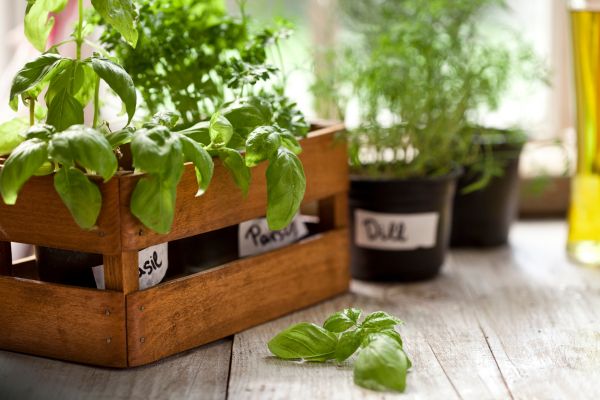As the golden years of life beckon, seniors find themselves embracing new opportunities to cultivate meaningful experiences and leave a lasting legacy. In this era of heightened environmental consciousness, seniors are discovering the inherent power they hold to contribute to a more sustainable world. Against the backdrop of a changing planet, seniors are embarking on a transformative journey of eco-consciousness, seeking activities that not only enrich their lives but also nurture the health of the environment. One such venture that epitomizes this harmonious balance is the enchanting world of herb gardening—a green and sustainable project that holds the promise of both delight and environmental stewardship.
Herb gardening emerges as a captivating endeavor, uniting seniors with the splendor of nature and the joys of nurturing life from seed to harvest. This eco-friendly pursuit extends beyond the boundaries of a typical pastime; it becomes a bridge to connect seniors with the timeless wisdom of the earth and the art of sustainable living. The act of cultivating an herb garden is a multi-dimensional experience, encompassing physical exercise, mental relaxation, and emotional fulfillment. As the fragrant herbs flourish under the tender care of seniors, they yield a multitude of benefits that resonate with both personal well-being and the well-being of the planet.
In this comprehensive guide, we embark on a verdant expedition into the world of herb gardening, tailored specifically for seniors seeking to embrace an eco-friendly project. We will delve into the myriad advantages of growing an herb garden, exploring the therapeutic and environmental benefits it bestows upon seniors. By selecting the ideal spot for the garden and choosing the perfect herbs to cultivate, seniors can set the stage for a successful and rewarding herb gardening journey. Furthermore, we will illuminate the sustainable practices that can further enhance the environmental impact of this project, transforming the garden into a sanctuary of ecological harmony. Embrace the allure of herb gardening, for it beckons seniors to co-create a vibrant tapestry of sustainability, joy, and evergreen memories.
The Benefits of Growing an Herb Garden
The journey of growing an herb garden offers seniors a multitude of benefits that span physical, mental, and environmental dimensions. Cultivating an herb garden is a gentle form of exercise that engages seniors in tasks like planting, watering, and harvesting, fostering mobility and promoting joint flexibility. The act of nurturing and tending to plants has been shown to reduce stress, anxiety, and symptoms of depression, providing a source of solace and tranquility amidst the hustle and bustle of life.
From a culinary perspective, growing herbs at home elevates the flavor profile of dishes, enhancing the enjoyment of meals with a burst of freshness and fragrance. Seniors can savor the satisfaction of knowing precisely where their food comes from, as they harvest their home-grown herbs without the use of harmful chemicals or pesticides. Moreover, herb gardens encourage biodiversity by attracting beneficial insects, such as bees and butterflies, which contribute to the pollination of nearby plants and promote a thriving ecosystem.
Selecting the Perfect Spot for Your Herb Garden
The success of an herb garden hinges on choosing the perfect location that meets the specific needs of these green wonders. Seniors should look for a spot that receives ample sunlight, preferably around six to eight hours per day. Most herbs thrive in full sun, basking in the warm rays that nurture their growth and enhance their flavors. South-facing windowsills, balconies, or patio spaces are excellent choices for herb gardens, as they offer a bountiful supply of sunlight.
In addition to sunlight, consider the accessibility of the chosen location. Seniors may want to select a spot that is easily reachable, especially if mobility is a concern. Raised garden beds or vertical herb gardens can be wonderful alternatives, as they provide ease of access and can be customized to fit the available space. By tending to their herb garden with convenience, seniors can fully immerse themselves in the joy of gardening without unnecessary physical strain.
Choosing and Caring for Your Herbs
Herb gardening opens a treasure trove of aromatic possibilities, each herb offering unique flavors and health benefits. For starters, consider growing versatile herbs like basil, mint, and parsley, which are relatively easy to cultivate and find numerous applications in culinary delights. If you have a penchant for Mediterranean cuisine, oregano, rosemary, and thyme make excellent additions to the garden.
When it comes to caring for herbs, seniors will find that these resilient plants require minimal effort for optimal growth. Ensure the herbs are planted in well-draining soil to prevent waterlogging and root rot. Water the herbs regularly, keeping the soil evenly moist but not saturated. Avoid overwatering, as this can be detrimental to the herbs’ health. Fertilize the herbs with organic compost or a balanced liquid fertilizer to provide the necessary nutrients for robust growth.
Sustainable Practices in Herb Gardening
As seniors embrace the joys of herb gardening, they can further enhance the eco-friendliness of their project by incorporating sustainable practices. Seniors can collect rainwater in barrels and use it to water their herbs, reducing reliance on potable water. Composting kitchen scraps and using the compost as a natural fertilizer is a wonderful way to close the loop and minimize waste.
To promote biodiversity and natural pest control, seniors can consider planting companion plants alongside their herbs. For instance, marigolds and chives repel harmful insects, while attracting beneficial ones, thereby reducing the need for chemical pesticides. Engaging in organic gardening practices not only benefits the environment but also ensures that the herbs are free from harmful residues, making them safer for consumption.
Embracing Herb Harvesting and Culinary Exploration
The culmination of the herb gardening journey arrives with the joyous act of harvesting the flavorful yields of the garden. Seniors can relish the delight of freshly picked herbs, elevating their culinary adventures to new heights. Harvest herbs in the morning when their essential oils are at their peak, ensuring the most intense flavors and aromas.
With a bounty of herbs at their disposal, seniors can embark on a delightful culinary exploration. From adding fresh basil to salads and crafting aromatic herb-infused oils to garnishing dishes with fragrant mint leaves, the possibilities are endless. Herb gardening not only nurtures the body but also nourishes the soul, as seniors indulge in the simple pleasures of savoring nature’s goodness.
Conclusion
As the tendrils of an herb garden stretch towards the heavens, so do the benefits it offers seniors on their journey of sustainable living. The art of herb gardening transcends mere cultivation; it becomes a therapeutic escape, a bountiful source of flavor, and an eco-friendly endeavor. By nurturing an herb garden, seniors create a sanctuary of serenity, a haven of health, and a legacy of environmental stewardship.
As the herbs flourish under the tender care of seniors, so does their well-being bloom, and their connection to the earth deepens. In the embrace of sunlight and the fragrance of herbs, seniors find solace, joy, and purpose. This eco-friendly project stands as a testament to the profound impact seniors can have on the planet and their communities, as they cultivate a garden that not only nourishes the body but also nourishes the heart and soul.
So, let us embark on this enchanting journey, hand in hand with nature, as seniors sow the seeds of an herb garden and reap the bountiful harvest of sustainable living. In the legacy of herbs, the threads of ecological harmony intertwine with the wisdom of age, weaving a tapestry of freshness, flavor, and everlasting impact for generations to come.



